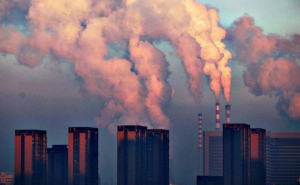Photos: YouTube\Wikimedia Commons
Climate change is a global crisis and cannot be solved by any one country alone. If the United States, China and other industrialized countries do not come together to dramatically decrease greenhouse gas emissions, the world we leave our children and future generations will become increasingly unhealthy and uninhabitable. Tragically, the cooperation required to address this existential threat is being undermined by hawks in both the United States and China who are moving us toward a disastrous cold war.

Now is the time for a radical rethinking of geopolitics to reflect the reality that international cooperation is not only in the best interests of all countries, but is absolutely necessary for the survival of the planet.
Here’s the reality. The last eight years have been the eight hottest on record. This year is on track to be the hottest year in recorded history, and this past July was the hottest month on record. Across the United States, July broke more than 3,200 daily temperature records and dozens of American cities broke or tied their previous daily temperature records three or more times. Phoenix experienced 31 days in a row at or above 110F (43.3C), 13 days longer than the previous record. El Paso, Miami, Austin and many other places also suffered under record-breaking stretches of extreme heat.
Smoke from unprecedented wildfires in Canada enveloped US cities and drifted halfway around the world, causing dangerously unhealthy air quality. Vermont, my home state, experienced floods that damaged 4,000 homes and 800 businesses, the state’s worst natural disaster since 1927.
In Maui, Hawaii, rapidly moving fires destroyed 2,700 structures in historic Lahaina and took more than 100 lives, making it the deadliest wildfire in the US in more than a century.

But it’s not just the US that is dealing with record-breaking heatwaves and enormous climate-caused devastation. China experienced record-high temperatures last month, including the country’s all-time temperature record of 126F (52.2C), and recent flooding has killed about 100 people, destroyed nearly 200,000 homes, displaced some 1.5 million people and caused more than $13bn in damage.
From Tokyo to Rome to Tunis to Tirana, cities across Asia, Europe and north Africa experienced their hottest days on record. In Iran, the heat index hit 158F (70C), testing the limits of human survival. In our own hemisphere, Cuba, the Dominican Republic and El Salvador all saw temperature records fall. It’s winter right now in South America, but that hasn’t stopped temperatures from exceeding 100F (37.7C) in some places, a heating event a climate historian labeled “one of the extreme events the world has ever seen”.
And it’s not just that temperatures have been soaring on land. Our oceans have never been warmer. Right now, 44% of the world’s oceans are experiencing a marine heatwave. The Mediterranean Sea is experiencing its hottest temperatures on record, more than 9F hotter than average in some places. Off the coast of Newfoundland, waters are as much as 18F above normal. South of Miami, waters reached 101F (38.3C). You’re supposed to find temperatures like that in a hot tub, not the ocean. This warming could further devastate coral reefs, fisheries and marine ecosystems around the world.
In the midst of this global crisis, there is both good news and bad news.
The good news is that recent years have seen long-overdue steps to transition the global economy away from fossil fuels into more efficient and renewable energy sources. In the United States, the Inflation Reduction Act included an unprecedented $300bn in investments in clean energy and energy efficiency, which could help increase US solar energy by 500% and more than double wind energy by 2035, reducing carbon emissions by roughly 40%.
Other countries have also made major investments. China spent $546bn on clean energy last year and continues to manufacture and deploy more renewable energy than the rest of the world combined. By 2030, China may deploy enough renewable energy to essentially power the entire US electrical grid three times over. The European Union has laid out a plan to invest more than $1tn over the next decade in renewables and energy efficiency, aiming to reduce greenhouse gas emissions by 55% compared with 1990.
Importantly, large sections of the corporate world have turned away from investments in fossil fuels and are now spending hundreds of billions on sustainable energy. Altogether, the International Energy Agency (IEA) expects the global community to invest $1.6tn in wind, solar power, electric vehicles, batteries, and electric grids this year, compared with just $1tn in fossil fuels. This progress has led the IEA to forecast that renewables will surpass coal to become the largest source of global electricity generation by early 2025, much faster than previously predicted.

The bad news is that we are still falling well short of the kinds of investments needed to deal with this crisis. We are still not moving fast enough to save our planet. The latest report from the United Nation’s Intergovernmental Panel on Climate Change (IPCC) projects that without more urgent action, the world will pass the key 1.5C (2.7F) threshold by the early 2030s, risking a far deadlier future for our children and future generations. The science is clear: if the US, China, and the rest of the planet do not act with greater urgency to dramatically cut carbon emissions, our planet will face enormous and irreversible damage.
Let’s be clear: since the beginning of the Industrial Revolution, the US has put more carbon into the atmosphere, by far, than any other country. While the new technologies sustained by fossil fuels improved our standard of living, we laid the groundwork for the climate calamity the planet is now experiencing.
In recent years, the rapidly growing Chinese economy has eclipsed the US as the world’s major carbon emitter. Right now, China is building six times as many coal-fired power plants as the rest of the world combined – the equivalent of two new coal plants every week. Last year, they quadrupled the number of new coal plants approved compared with 2021. Current plans will see China add as much new coal to its grid as used in all of India, the second largest coal user, and five times more coal capacity as the US.
It is no great secret the Chinese government is undertaking many policies that we and the international community should oppose. They are cruelly repressing and interning the Uyghurs, threatening Taiwan and stifling freedom of expression in Tibet and Hong Kong. China has bullied its neighbors, abused the global trading system, stolen technology and is building out a dystopian surveillance state.
The US is rightly organizing its allies to press Beijing on these and other issues. But organizing most of our national effort around a zero-sum global confrontation with China is unlikely to change Chinese behavior and will alienate allies and partners.
Most importantly, it could doom our planet by making climate cooperation impossible between the world’s two largest greenhouse emitters. We need to move in a bold new direction. Recent history provides some instructive examples.
In 1962, when the US and the Soviet Union stood on the verge of nuclear war, President John F Kennedy and the Soviet leader, Nikita Khrushchev, came together to prevent mutual destruction. Just a few months later, with the nuclear crisis as the background, President Kennedy proposed to the Soviet Union an arms reductions plan which would change the confrontational dynamic that had brought the world to the brink. Even arch anti-communists like Nixon and Reagan made bold gambits to reduce tensions, fearful of global annihilation. We face a similar dynamic today, facing collective catastrophe if we do not change course.

Here is the insane dynamic that must be changed. In recent years, both the US and China have greatly increased their military budgets. The US now spends some $900bn on the Pentagon, more than the next 10 nations combined. China, with the world’s second largest military budget, spends almost $300bn. Despite spending these huge amounts on “defense”, both countries are losing the war against the climate crisis. The US has experienced massive floods, fires, drought and extreme weather disturbances, which have cost us hundreds of billions. The recent flooding in China alone will cost that government tens of billions. Into the future, scientists tell us that great cities like Shanghai and New York will be underwater if we do not act effectively against the climate crisis.
So here’s a “radical” idea. Instead of spending enormous amounts of money planning for a war against each other, the US and China should come to an agreement to mutually cut their military budgets and use the savings to move aggressively to improve energy efficiency, move toward sustainable energy and end our reliance on fossil fuels. They should also provide increased support for developing countries who are suffering from the climate crisis through no fault of their own.
Now, I know that establishment politicians in both countries will tell me how naive and unsophisticated I am to offer such a suggestion and they will provide a million reasons as to why it can’t be done. My response is this: go talk to the people in Vermont who have lost their homes because of unprecedented flooding and the families in Hawaii who lost loved ones in the recent fires. Go talk to the more than 1 million people in China who have been displaced by catastrophic floods. Go talk to the people in southern Africa who are starving because of the terrible drought and floods they are experiencing or farmers around the world who can no longer grow their crops because of water shortages.
Perhaps most importantly, go talk to the hundreds of millions of young people in every country on earth who are losing hope, wondering whether they should even have children of their own, given the enormous challenges the climate crisis poses for a normal life.
Nelson Mandela famously remarked; “It always seems impossible until it’s done.”
If we are to save the planet, now is the time for bold action. Let’s do it.








